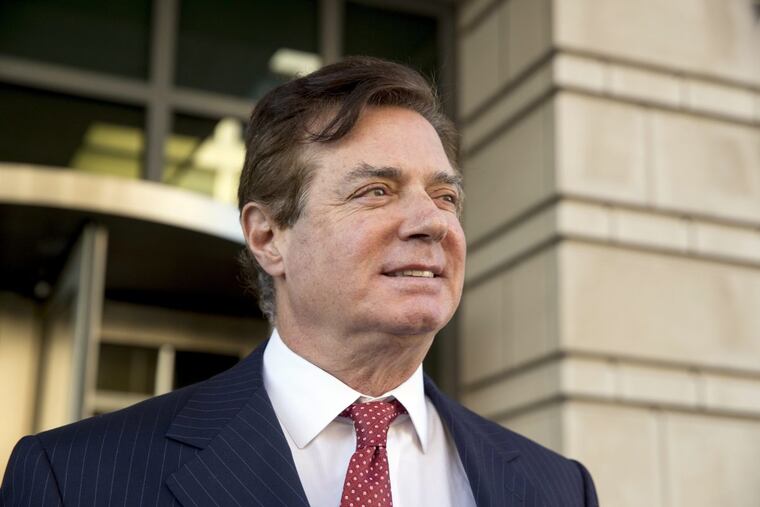Former Trump campaign chairman Manafort, US prosecutors spar over his wealth ahead of Monday bail hearing
Legal teams for former Trump campaign chairman Paul Manafort and special counsel Robert Mueller sparred in weekend court pleadings over the full extent and disclosure of Manafort's assets as a Monday morning hearing loomed over his bail and release terms.

WASHINGTON – Legal teams for former Trump campaign chairman Paul Manafort and special counsel Robert Mueller sparred in weekend court pleadings over the full extent and disclosure of Manafort's assets as a Monday morning hearing loomed over his bail and release terms.
Manafort and business partner Rick Gates pleaded not guilty Oct. 31 in the first criminal allegations in Mueller's probe of possible Russian influence in U.S. political affairs.
The two defendants were placed under house arrest through the weekend after Manafort pledged to pay $10 million and Gates $5 million if they failed to appear for future court appearances.
The pair were charged in a 12-count indictment with conspiracy to launder money, making false statements and other offenses in connection with their work advising a Russia-friendly political party in Ukraine.
U.S. District Judge Amy Berman Jackson in Washington said Friday she believed each posed a flight risk significant enough to warrant remaining under electronic monitoring via GPS tracking throughout the case. She set the Monday hearing to decide that question.
In court proceedings, prosecutors have said the scope of Manafort's wealth was unknown to the government, and appear to be using the bail fight as leverage to pry out more information.
Prosecutors on Sunday evening pressed the court to require Manafort "to represent the full extent of his assets, in the United States and abroad" to secure bond.
Manafort's lawyers in filings Saturday asked for his release from at his condo in Alexandria, Virginia, and unrestricted travel in Florida, Virginia, the District of Columbia and New York, where he does business. They offered to post $12.5 million of his claimed $28 million in assets as security by way of his Trump Tower apartment, another condominium in Manhattan, a home in Palm Beach Gardens, Florida, and $4.5 million in life insurance policies held by trusts or his wife, Kathleen.
Manafort's defense rejected prosecutors' assertions that he poses a risk of flight based on his ownership of three passports, and on the registration in May of a phone and email account under an alias that Manafort used to travel to Ecuador, China and Mexico.
While some reports painted the 68-year-old defendant as a "Jason Bourne" character, the facts "were much more mundane," Manafort attorneys Kevin M. Downing and Thomas E. Zehnle wrote Saturday in court filings. Manafort got a second passport so he could apply for visas when the first was being used, and applied for a third when he mistakenly thought the first was lost, they said. They did not specifically address prosecutors' additional claim in the indictment that Manafort had submitted 10 passport applications in 10 years.
Traveling with a phone under his brother's name should not be surprising "given the high-profile nature of some of Mr. Manafort's clients," his attorneys wrote, suggesting that such a phone arrangement was common practice to defend against confiscation or hacking of data.
Finally, they said, "One's frequent flier status should not be over-emphasized to show a potential risk of flight when a person's job requires extensive travel," referring to Manafort, who is an international political consultant. "Substantial financial conditions, travel restrictions, and other conditions of release will reasonably assure Mr. Manafort's appearance as required," Downing and Zehnle concluded.
Prosecutors said in their Sunday filings ahead of the bail review that Manafort had yet to provide documentation to substantiate his claimed $28 million of assets or net worth. They previously said that Manafort had claimed $136 million in assets in financial documents in May 2016.
"The government seeks to further understand the full extent of Manafort's wealth," Mueller team prosecutors Andrew Weissmann, Greg D. Andres and Kyle R. Freeny wrote. "Without that information, the government cannot be assured that whatever assets that Manafort pledges are sufficiently meaningful in relation to his overall net assets to reasonably assure his presence at trial."
Once Manafort makes a full disclosure of assets, prosecutors proposed lifting house arrest in exchange for a $10 million bond by Manafort secured by two individuals, such as his wife or a daughter, Andrea, and properties. They also propose the court lay down conditions that he hold no passport; not travel outside Virginia, New York and Florida; and not encumber assets or transfer them overseas.
Prosecutors questioned Manafort's claimed net value in his Trump Tower and Florida homes, and argued that the government has already sought the criminal forfeiture of some of Manafort's life insurance holdings if he is convicted.
Other real estate in Alexandria and the Hamptons is subject to a $9.5 million mortgage, making them "inappropriate" as security, prosecutors said.
Additionally, through at least 2014, Manafort reported a $6 million asset in Ukraine, before claiming that it lost all value, they alleged. Other claimed assets, such as securities, do not match information available to the government or are unsubstantiated, they wrote.
"The government is not prepared to consent to a change in the current conditions of release at least until Manafort provides a full accounting of his net worth and the value of the assets that he proposes to pledge as part of his bail package," special counsel prosecutors wrote.
Jackson, the judge, on Friday deferred ruling on release terms until seeing each side's requests, but said she considered GPS tracking important: "I think if they leave and don't come back, we need to know where they went."